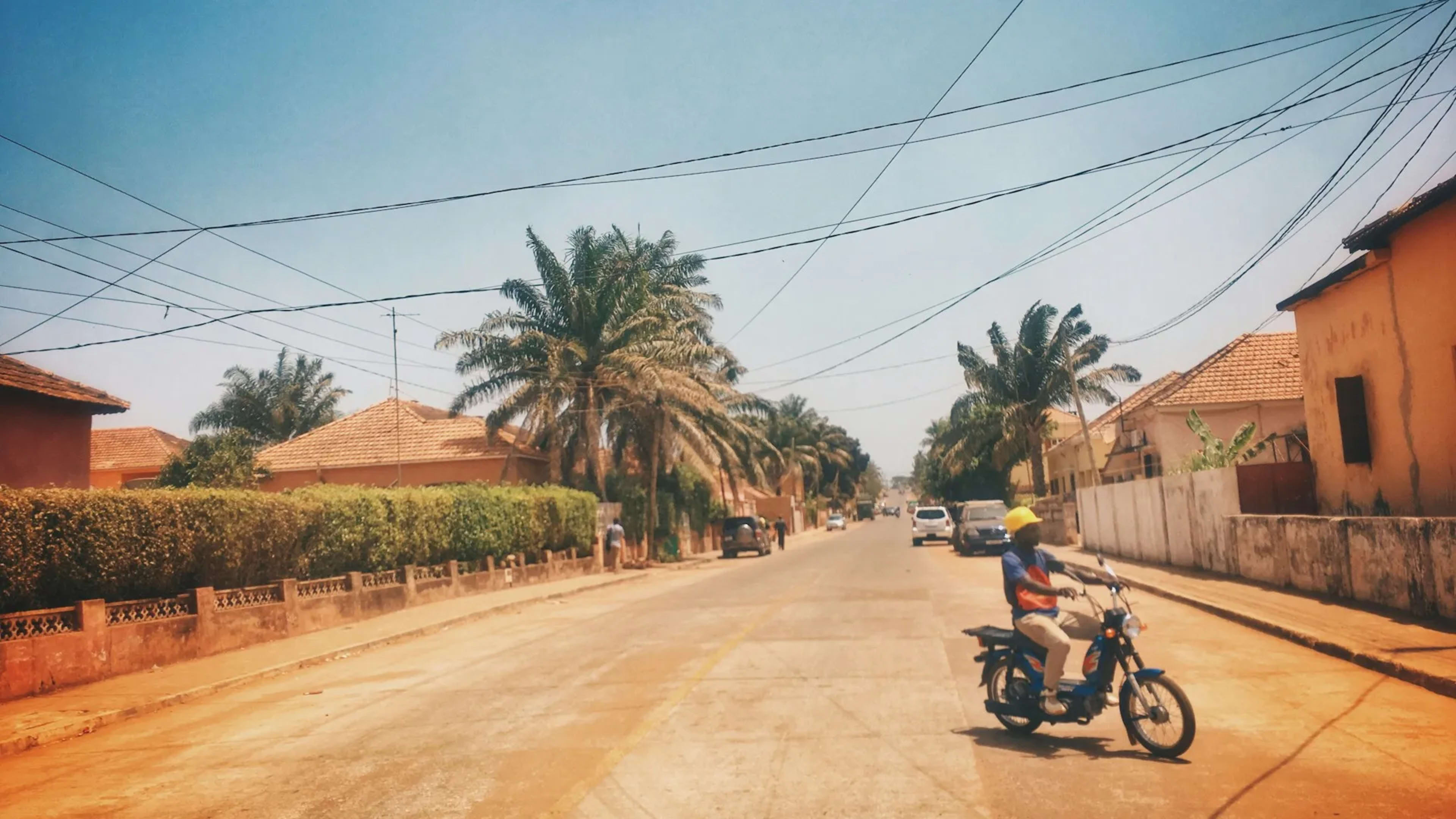Location & Transportation
Since cruise ships cannot dock directly in Bissau, you will be tendered ashore. This means you’ll take a short boat ride to reach the port area – a unique introduction to the local harbor. Once onshore, local taxis (including shared taxis) are an affordable way to get around. I found that hailing one is as simple as signaling when one passes by; just let the driver know your destination and confirm the fixed price before you set off.
Sightseeing
Bissau offers a mix of intriguing historical sites and charming local neighborhoods. On my visit, I enjoyed exploring these highlights:
- Bissau Velho: Wander through the old Portuguese colonial center. Stroll past weathered buildings and don’t miss the old prison adorned with pink flowers near the fort.
- Porto Pidjiguiti: Step out by the little port to chat with local fishermen, watch graceful pelicans, and visit the monument—a gigantic black fist commemorating the 1959 Pidjiguiti massacre that sparked resistance against colonial rule.
- Fortaleza d’Amura: Discover this ancient fort that now houses the mausoleum of national hero Amílcar Cabral along with tombs of other revolutionaries. Look closely for unique historical items like Cabral’s old car and a Cuban-donated statue.
- Museu Etnográfico Nacional: Located on the university campus, this small museum features local wooden masks, artifacts, and traditional clothing. The friendly staff really helped me understand how these items connect to local spiritual beliefs.
- The Presidential Palace: Although bombed during the civil war, its remains echo stories of the past and add to Bissau’s intriguing atmosphere.
Tours & Excursions
For a real taste of local life, consider these options:
- Shared Taxis: They are very affordable and plentiful. Simply flag one down and state your destination in a friendly manner. Prices are fixed, so you’ll rarely need to negotiate.
- Local Excursion Tips:
- Make sure to confirm your ride by asking fellow travelers or locals.
- Vaccination advice: It’s a good idea to have up-to-date yellow fever, hepatitis A, tetanus, and typhoid vaccinations. Malaria prophylaxis is also highly recommended. Check with your doctor well before your trip.
It‘s a good idea to compare shore excursion costs between what your cruise line offers and options like Viator and GetYourGuide. They often provide lower prices and include customer reviews and ratings to help you choose the best option. They may also offer more more flexible cancellation or rescheduling policies than those available through your cruise line. However, while booking independently might give you more variety and potentially better rates, be mindful of your schedule - cruise line excursions are typically coordinated to match your ship‘s schedule with guaranteed pick-up and drop-off times.
There is also a great resource for finding local guides at Tours by Locals. Tours by Locals connects you with local guides who can help you plan a private personal tour, guide you, and get you back to your ship on time. You can also check out Rome2Rio for local transportation options. It is a great resource for finding how to get from one place to another, including public transportation, taxis, ferries, and more.
Shopping
Bissau’s vibrant local market scene is not to be missed. At Mercado de Bandim, the largest market in the country, you can browse an eclectic mix of local crafts, fresh produce, and everyday items. The lively atmosphere makes it a wonderful spot to pick up unique souvenirs and experience the city’s rhythm.
Dining
Local cuisine in Bissau is a delightful blend of African flavors and Portuguese influences. On my visit, I enjoyed sampling freshly prepared seafood and hearty stews at small local eateries. Ask locals for their favorite spots—you might discover a hidden gem serving traditional dishes like seafood calulu accompanied by tropical fruits and local spices. Venturing into neighborhoods near the market is a great way to find authentic flavors and warm hospitality.
Culture & Local Events
Bissau is a city where history meets vibrant local traditions. Here are some cultural insights and essential travel tips:
- Currency & Payments: The West African CFA franc (XOF) is the local currency. While larger establishments may accept Euros, it’s best to have some local cash to fully enjoy market bargains and everyday transactions.
- Language & Communication: Portuguese is the official language. Although you might hear a few local African languages in conversation, having a basic Portuguese phrasebook can really help you connect with residents.
- Local Events & Traditions: The city often hosts community festivals, live music performances, and art shows that celebrate its rich cultural heritage. If your visit coincides with one of these events, take the opportunity to join in the festivities.
- Safety & Awareness: As with many busy port towns, it’s wise to keep an eye on your belongings and be aware of your surroundings. Trust your intuition and ask locals for advice if you’re unsure about a particular area.
